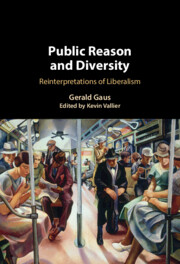Book contents
- Public Reason and Diversity
- Public Reason and Diversity
- Copyright page
- Contents
- Figures
- Tables
- A Note on the Essays
- Introduction
- Part I Liberalism
- Chapter 1 Reasonable Pluralism and the Domain of the Political
- Chapter 2 On Justifying the Moral Rights of the Moderns
- Chapter 3 Recognized Rights as Devices of Public Reason
- Chapter 4 The Moral Foundations of Liberal Neutrality
- Chapter 5 Coercion, Ownership, and the Redistributive State
- Part II Diverse Public Reason
- Index
Chapter 2 - On Justifying the Moral Rights of the Moderns
A Case of Old Wine in New Bottles*
from Part I - Liberalism
Published online by Cambridge University Press: 18 October 2022
- Public Reason and Diversity
- Public Reason and Diversity
- Copyright page
- Contents
- Figures
- Tables
- A Note on the Essays
- Introduction
- Part I Liberalism
- Chapter 1 Reasonable Pluralism and the Domain of the Political
- Chapter 2 On Justifying the Moral Rights of the Moderns
- Chapter 3 Recognized Rights as Devices of Public Reason
- Chapter 4 The Moral Foundations of Liberal Neutrality
- Chapter 5 Coercion, Ownership, and the Redistributive State
- Part II Diverse Public Reason
- Index
Summary
We are familiar with one divide between “old” and “new” liberalism – that between classical liberalism and social justice liberalism. Although this divide between the old and the new is multifaceted, the crux is a debate about the place of the market, private property, and democracy in a liberal polity. According to common wisdom, classical liberals insist on rights of the person against others and against a limited government, freedom of association, freedom of conscience, and a free market within a framework of laws against fraud and violence, laws enforcing contracts, and strong rights of private property, including robust rights of investment, exchange, and inheritance. Limited democracy is endorsed as a way to control government, but not as a source of fundamental norms. Social justice liberals, while endorsing traditional civil rights – for example, the freedoms of speech, press, and religion, rights against search and seizure, the right to a fair trial, privacy rights, equal protection of the laws, and, generally, liberties of the person – argue that justice fundamentally concerns the distribution of resources or that one’s basic claims of justice are to resources that one needs or deserves. Thus, such liberals lay great stress on policies to alter the distribution of property, or to enforce social rights to assistance. Moreover, such liberals emphasize the role of democratic institutions in a liberal polity. Indeed, in recent years, social justice liberals such as John Rawls and his followers have declared themselves to be “deliberative democrats,” who value political participation rights equally with civil liberties. While of course inadequate, this familiar stylized contrast between classical liberalism and social justice liberalism captures a good deal of the truth.
- Type
- Chapter
- Information
- Public Reason and DiversityReinterpretations of Liberalism, pp. 38 - 76Publisher: Cambridge University PressPrint publication year: 2022



